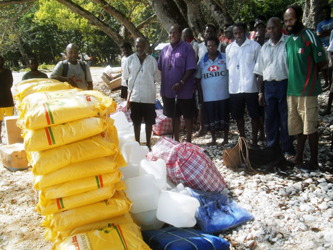ABM Archive Website
THIS WEBSITE CONTAINS ARCHIVE MATERIALS FOR HISTORICAL REFERENCE ONLY
For up-to-date information, including our latest appeals, news, and resources, please visit our current website.
Six Months on – the Recovery in Vanuatu
October 2, 2015

It is six months since Cyclone Pam wreaked havoc on the island nation of Vanuatu and the church is helping to rebuild communities with the assistance of ABM.
With funds raised by ABM and the ACT Alliance, the Anglican Church of Melanesia, Vanuatu (ACOMV) has worked hard to provide relief assistance to around 13,000 people who were in need of food and clean water.
ABM raised over $300,000 through its Vanuatu Emergency Appeal, with the majority of this funding
going towards the current reconstruction phase.
Jessica Sexton, ABM Programs Officer for Vanuatu said, “It is due to the generosity and compassion of
ABM supporters that both the relief and the longer term reconstruction responses were possible. We
would like to sincerely thank all who contributed, and prayed for the welfare of those affected by this
terrible disaster. Your practical actions have enabled short and long-term food security needs to be met, and will help equip communities to better prepare for disaster in the future.”
A report on the recovery work in Vanuatu
Focusing on the provinces of Penema and Torba to the north, ACOMV delivered food aid, seeds and gardening tools to 25 districts and three institutions, using the church flagship to ferry the supplies to remote communities throughout the area. This was vital to both short and long-term food security, as household food gardens provide the bulk of the nutritional needs to families, but were largely decimated by the high winds and heavy rain in March.
The impact of Cyclone Pam also left natural water sources such as rivers and streams contaminated with leaves and mud, prompting the need for additional water purification kits (including containers and tablets) in order to protect communities from water-borne diseases. These were also delivered in the initial relief response of ACOMV, to the affected districts.
The ACOMV Disaster Committee is currently concentrating on rehabilitation and reconstruction activities, now that immediate relief needs have been met. The assessment reports carried out in each affected community revealed several schools were in need of repairs to damaged buildings, with students were being prevented from using classrooms with leaking roofs. The repair or rebuilding of some dormitories was also prioritised, as students are currently using alternative community houses and temporary shelters for accommodation.
The overwhelming need that was identified during the assessments were for Disaster Risk Reduction training, the building of Cyclone-proof evacuation centres, water and sanitation facilities, and the stockpiling of Emergency supplies.
Many communities lacked adequate evacuation shelters to protect them from the cyclonic winds and rain, and following there was a great need for water and sanitation infrastructure as waterways became muddied by debris. Due to the long disruption to supply ships, many essential items (such as soap and matches) disappeared, and the islands were unable to communicate due to disruptions to the mobile phone services.
Providing these essential buildings and supplies is therefore seen as a priority for ACOMV, in preparation for any future emergencies. This is to be complemented with community training in risk management and evacuation plans, in order to prepare people both physically and psychologically.
To assist ACOMV in the coordination of this response, ABM will be contributing toward the employment of an Emergency Response Coordinator, and a Disaster Risk Reduction mentor, in order to support the vast amount of work involved. It is expected that this response and the work to ensure communities are better prepared for any future cyclone will continue until March 2017.


